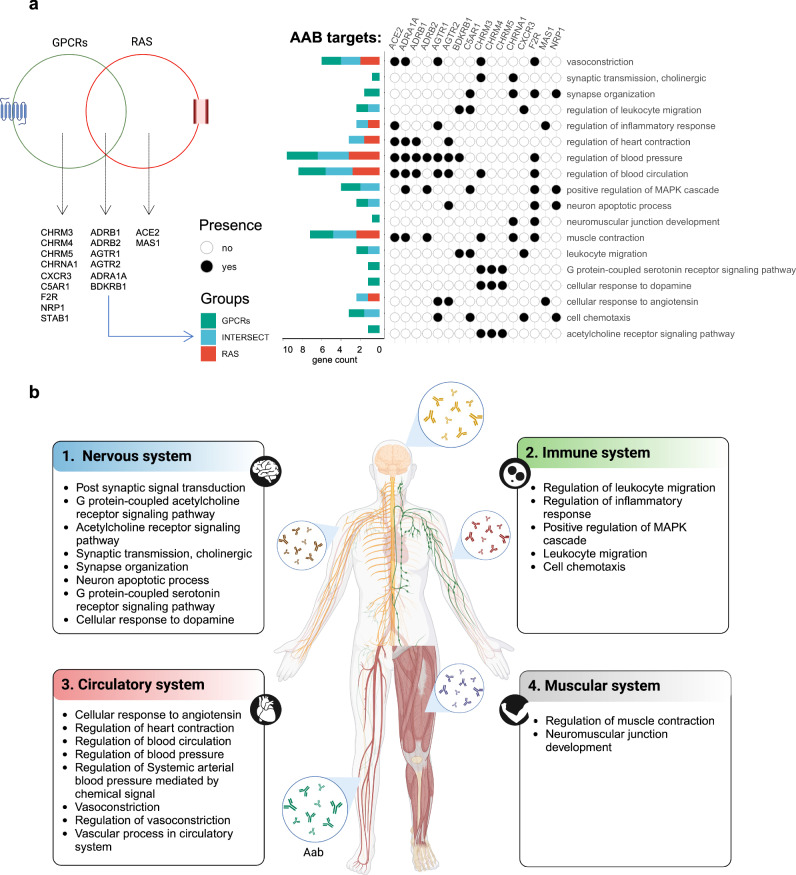Dysregulated autoantibodies targeting AGTR1 are associated with the accumulation of COVID-19 symptoms.
Coronavirus disease 2019 (COVID-19) presents a wide spectrum of symptoms, the causes of which remain poorly understood. This study explored the associations between autoantibodies (AABs), particularly those targeting G protein-coupled receptors (GPCRs) and renin‒angiotensin system (RAS) molecules, and the clinical manifestations of COVID-19. Using a cross-sectional analysis of 244 individuals, we applied multivariate analysis of variance, principal component analysis, and multinomial regression to examine the relationships between AAB levels and key symptoms. Significant correlations were identified between specific AABs and symptoms such as fever, muscle aches, anosmia, and dysgeusia. Notably, anti-AGTR1 antibodies, which contribute to endothelial glycocalyx (eGC) degradation, a process reversed by losartan, have emerged as strong predictors of core symptoms. AAB levels increased with symptom accumulation, peaking in patients exhibiting all four key symptoms. These findings highlight the role of AABs, particularly anti-AGTR1 antibodies, in determining symptom severity and suggest their involvement in the pathophysiology of COVID-19, including vascular complications.
Authors
Fonseca DLM, Jäpel M, Gyamfi MA, Filgueiras IS, Baiochi GC, et al.
External link
Publication Year
Publication Journal
Associeted Project
Systems Immunology of Human Diseases
Lista de serviços
-
As antisense RNA gets intronic.As antisense RNA gets intronic.
-
Androgen responsive intronic non-coding RNAs.Androgen responsive intronic non-coding RNAs.
-
Conserved tissue expression signatures of intronic noncoding RNAs transcribed from human and mouse loci.Conserved tissue expression signatures of intronic noncoding RNAs transcribed from human and mouse loci.
-
The intronic long noncoding RNA ANRASSF1 recruits PRC2 to the RASSF1A promoter, reducing the expression of RASSF1A and increasing cell proliferation.The intronic long noncoding RNA ANRASSF1 recruits PRC2 to the RASSF1A promoter, reducing the expression of RASSF1A and increasing cell proliferation.
-
Antisense intronic non-coding RNA levels correlate to the degree of tumor differentiation in prostate cancer.Antisense intronic non-coding RNA levels correlate to the degree of tumor differentiation in prostate cancer.
-
Insight Into the Long Noncoding RNA and mRNA Coexpression Profile in the Human Blood Transcriptome Upon Leishmania infantum Infection.Insight Into the Long Noncoding RNA and mRNA Coexpression Profile in the Human Blood Transcriptome Upon Leishmania infantum Infection.
-
Long non-coding RNAs associated with infection and vaccine-induced immunityLong non-coding RNAs associated with infection and vaccine-induced immunity
-
Comparative transcriptomic analysis of long noncoding RNAs in Leishmania-infected human macrophagesComparative transcriptomic analysis of long noncoding RNAs in Leishmania-infected human macrophages
-
SARS-CoV-2 Selectively Induces the Expression of Unproductive Splicing Isoforms of Interferon, Class I MHC, and Splicing Machinery Genes.SARS-CoV-2 Selectively Induces the Expression of Unproductive Splicing Isoforms of Interferon, Class I MHC, and Splicing Machinery Genes.

